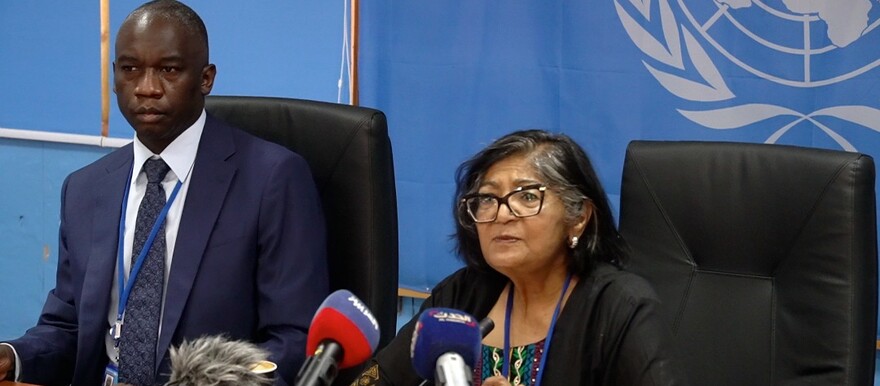The United Nations Human Rights Commission on South Sudan on Friday warned of increased political violence and polarisation in South Sudan, as the transitional period nears an end.
The members of the commission are concluding a five-day visit to assess the human rights situation in the country.
Addressing journalists in a press conference in Juba today, Yasmin Sooka, Chairperson for the UN Human Rights Commission on South Sudan said, “There is a consensus amongst key stakeholders that while some progress has been made in implementing the Revitalized Agreement, critical elements involving security sector reform, constitutional and electoral reform, and transitional justice have yet to be addressed. All of these outstanding issues impact the human rights situation in the country.”
Sooka urged parties to the 2018 revitalized peace agreement to implement all provisions in Chapter 5 that calls for accountability, truth, and reconciliation.
“The lack of progress in implementing key provisions of the revitalized agreement, including the unification, graduation, and deployment of the armed forces, as well as agreement on command structures, contributes to persistent insecurity and impunity in which human rights violations occur,” Commission Chair Sooka said. “Violence at subnational levels remains pervasive and is characterized by displacement, and gross human rights violations including sexual violence. Yei is a case in point, where soldiers waiting to be part of a unified national force are poorly resourced and then prey on the population.”
The commissioners said members of the civil society who met them said they are scared to discuss the human rights situation for fear of reprisal by state security services with a track record of violently repressing the expression of political views.
Human rights Commissioner Barney Afako said South Sudan is at a critical juncture as the transitional period comes to a close despite the ongoing subnational violence and lack of a will to implement aspects of the 2018 agreement.
Afako urged South Sudanese leaders to unite and work for the interests of the people of South Sudan while putting in place the foundation for healing, truth, and return of those displaced and refugees.
“South Sudan is at a tipping point. The pursuit of elections runs the serious risk of fuelling violence and polarization if the requisite institutions, constitutional and electoral laws as well as logistic arrangements are not first in place,” he said. “It is also important to look beyond the electoral moment and ask what political system people would be voting for, particularly given the delays to develop a constitution on which elections would be based.”
In Juba and Yei, the commissioners met with senior government officials, members of the civil society and victims’ groups, religious groups, entities monitoring the 2018 Revitalized Peace Agreement, members of the diplomatic communities including from the Troika and the African Union, and representatives of UN Agencies and the UN Mission in South Sudan (UNMISS).
The UN Commission on Human Rights in South Sudan is an independent body mandated by the UN Human Rights Council. It was first established in March 2016 to investigate the situation of human rights in South Sudan and to determine and report the facts and circumstances of human rights violations and abuses, including by clarifying responsibility for violations and abuses that are crimes under national and or international law.
To assist in addressing impunity in South Sudan, the Commission is also mandated to collect and preserve evidence and to make this available to transitional justice mechanisms, including the hybrid court for South Sudan that is to be established under Chapter 5 of the Revitalised Peace Agreement of 2018.
The Commission will present its next report on the human rights situation in South Sudan to the UN Human Rights Council in March 2022, in Geneva, Switzerland.




